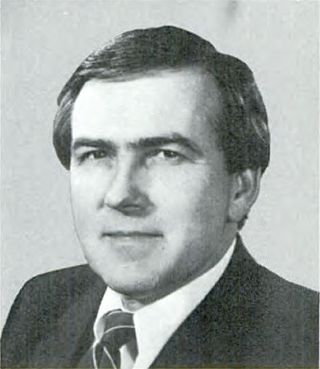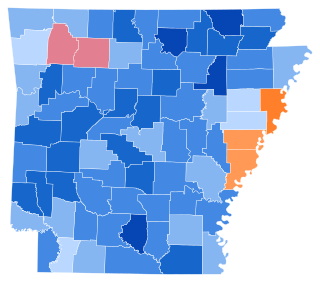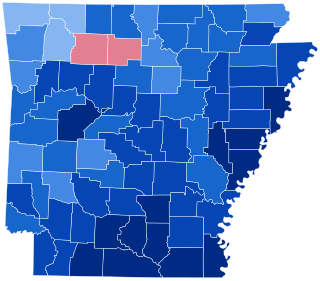
The 1964 United States presidential election was the 45th quadrennial presidential election. It was held on Tuesday, November 3, 1964. Incumbent Democratic President Lyndon B. Johnson defeated Republican Senator Barry Goldwater in a landslide victory. Johnson was the fourth and most recent vice president to succeed the presidency following the death of his predecessor and win a full term in his own right. Johnson won the largest share of the popular vote for the Democratic Party in history at 61.1%. As of 2024, this remains the highest popular vote percentage of any candidate since the advent of widespread popular elections in 1824.

Searcy County is a county located in the U.S. state of Arkansas. As of the 2020 census, the population was 7,828. The county seat is Marshall. The county was formed December 13, 1838, from a portion of Marion County and named for Richard Searcy, the first clerk and judge in the Arkansas Territory. The city of Searcy, Arkansas, some 70 miles away, shares the name despite having never been part of Searcy County. The county is an alcohol prohibition or dry county.

Orval Eugene Faubus was an American politician who served as the 36th Governor of Arkansas from 1955 to 1967, as a member of the Democratic Party. In 1957, he refused to comply with a decision of the U.S. Supreme Court in the 1954 case Brown v. Board of Education, and ordered the Arkansas National Guard to prevent black students from attending Little Rock Central High School. This event became known as the Little Rock Crisis. He was elected to six two-year terms as governor.

Winthrop Rockefeller was an American politician and philanthropist. Rockefeller was the fourth son and fifth child of American financier John D. Rockefeller Jr. and Abby Aldrich Rockefeller. He was one of the grandchildren of Standard Oil co-founder John D. Rockefeller. As an entrepreneur in Arkansas, he financed many local projects, including a number of new medical clinics in poorer areas, before being elected state governor in 1966, as the first Republican governor of Arkansas since Reconstruction. Despite accusations of lacking insight into the concerns of low-income voters, Rockefeller was re-elected in 1968, and went on to complete the integration of Arkansas schools.

Frank Durward White was an American banker and politician who served as the 41st governor of Arkansas. He served a single two-year term from 1981 to 1983.

Joe Edward Purcell was an American politician and attorney who served as Acting Governor of Arkansas for six days in 1979. A member of the Democratic Party, he served as the 45th Attorney General of Arkansas from 1967 to 1971 and the 13th Lieutenant Governor of Arkansas from 1975 to 1981.

Benjamin Travis Laney, Jr., was an American businessman who served as the 33rd governor of Arkansas from 1945 to 1949.

Tommy Franklin Robinson was an American businessman, lobbyist, and politician who served as the U.S. representative for Arkansas's 2nd congressional district from 1985 to 1991. He was a member of the Republican Party. Before he was elected to Congress, Robinson was the sheriff of Pulaski County.

The 2006 Arkansas gubernatorial election took place on Tuesday, November 7, 2006. Incumbent Republican governor Mike Huckabee was barred from seeking candidacy due to term limits set by the State Constitution in 1998, stating that the governor may only serve two terms in their lifetime. Democratic State Attorney General Mike Beebe, defeated Republican former U.S. representative Asa Hutchinson by a wide margin. This was the first open seat election since 1978. Hutchinson later won the governorship in 2014 when Beebe was term limited.

The 1980 Arkansas gubernatorial election was a biennial election for the governorship of Arkansas. One-term Democratic governor and future president Bill Clinton was narrowly defeated by Republican Frank D. White. It was only the third time since Reconstruction that a Republican candidate had won the state's governorship.

The 1982 Arkansas gubernatorial election was held on November 2, 1982. Former Democratic governor Bill Clinton regained the position after having narrowly been defeated by Republican candidate Frank D. White at the previous election. Clinton held the position from January 1983 until he resigned after being elected president in 1992. As of 2024, this is the last time that an incumbent governor of Arkansas lost re-election.

Aylmer Lynn Lowe, known as A. Lynn Lowe, was an American businessman and politician from Garland near Texarkana in Miller County in southwestern Arkansas, who was a major figure in the Arkansas Republican Party. He was the Republican gubernatorial nominee in 1978 against the Democrat Bill Clinton, served as state party chairman from 1974 to 1980, and was the GOP candidate in Arkansas's 4th congressional district in 1966, having been defeated by the Democrat David Pryor, then a state representative and a future governor and U.S. Senator, originally from Camden in Ouachita County in south Arkansas.
Danny Lee Patrick was an educator and farmer from rural Delaney in Madison County, Arkansas, who served from 1967 to 1970 as a Republican member of the Arkansas House of Representatives for Madison and neighboring Carroll counties in the northwestern corner of his state. His legislative service coincided exactly with the administration of Winthrop Rockefeller, Arkansas' first GOP governor since Reconstruction.
William Leach Spicer was a businessman from Fort Smith, Arkansas, who from 1962 to 1964 was the embattled state chairman of the Arkansas Republican Party.
James Lee Sheets, known as Jim Sheets, was a businessman from Bella Vista, Arkansas who was a former member of the Arkansas House of Representatives in the Republican Party. From 1967 to 1968, Sheets represented Benton County for a single term in the lower legislative chamber.
Sterling Robertson Cockrill Jr. was an American politician, civic leader and artist in Little Rock, Arkansas.
Marion Harland Crank was an American Democratic politician from Foreman in Little River County in the U.S. state of Arkansas. He served in the Arkansas House of Representatives from 1951 to 1968. He was the Speaker of the Arkansas House of Representatives from 1963 to 1964 and his party's gubernatorial nominee in 1968, but he was narrowly defeated by the incumbent Republican Winthrop Rockefeller.

The 1948 United States presidential election in Arkansas took place on November 2, 1948, as part of the 1948 United States presidential election. State voters chose nine representatives, or electors, to the Electoral College, who voted for president and vice president. This would be the last presidential election where Arkansas had nine electoral votes: the Great Migration would see the state lose three congressional districts in the next decade-and-a-half.

The 1936 United States presidential election in Arkansas took place on November 3, 1936, as part of the 1936 United States presidential election. State voters chose nine representatives, or electors, to the Electoral College, who voted for president and vice president.

The 1940 United States presidential election in Arkansas took place on November 5, 1940, as part of the 1940 United States presidential election. State voters chose nine representatives, or electors, to the Electoral College, who voted for president and vice president.














